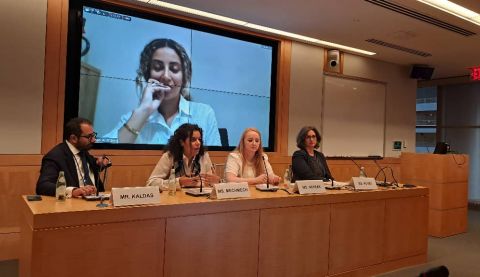2024 annual meetings of the IMF and World Bank
11 December 2024
The IMF and World Bank Annual Meetings in October brought forward critical conversations about macroeconomic policies, debt, taxation, and their gendered and intersectional impacts. While the IMF's rhetoric appeared loosely to acknowledge the need for equity and justice, realities for millions of people in the Global South told a very different story.

The different sessions have indeed discussed how austerity policies impact especially marginalised groups. From the erosion of public services to regressive taxation fuelling food insecurity, there are far-reaching consequences beyond economic hardships. And these tragic ripples shine a light, if anything else, that economic policy exacerbates social inequalities, linking austerity to what could only be described as structural violence. As long advocated for CSOs and movements, the global financial architecture is in need of a complete overhaul for a debt-free world that prioritises wellbeing for humans and the planet.
Debt transparency and accountability: more than lip service
The discussions on debt transparency gave insights into the colonial roots of debt, showing its modern forms. Most governments borrow to "fix the gap" without a clear plan for sustainability, which leaves their citizens with the burden of repayment.
The case of Malawi presents a very clear case of systemic accountability gaps. While loan approvals are a provision in the Public Finance Management Act, these are not legally binding, thus creating room for unchecked debt accumulation. Advocacy should focus on strengthening such frameworks and holding the IMF accountable for actual use of loans, as past cases of document misreporting have been recorded.
Furthermore, institutions like the IMF must urgently and proactively engage in measures to restructure and cancel the debt of countries facing debt distress and crisis, including by supporting sovereign debt workout mechanisms as well as enact binding requirements for private lenders to participate in debt workout processes.
Centring gender and care economies in policy design
Care economy became one of the current matters, where a call was made to approach it from a justice and decolonial perspective. Progressive-designed taxation can become a tool for redistribution to serve the care systems that uphold human rights. Yet, this contradictory stance by the IMF in pushing for social spending while enforcing regressive tax policies evidences the need for systemic change.
The care economy only underscores a broader truth: economies have to prioritise wellbeing and rights over profits and growth metrics. Yet, the IMF's country-level gender impact assessments remain remarkably opaque, often relegating civil society voices to the sidelines in favour of elite engagements.
Climate justice and economic equity: two sides of the same coin
The discussions on climate justice emphasised how environmental and economic crises are intertwined. So far, significant responsibility for the climate and debt crisis lies with the Global North. However, it has not been held responsible yet. Support to the Global South should not come as loans but as a reparative measure.
As Shereen Talaat from MENAFEM aptly put it, "A just transition from the bank is just a transition, not justice." The way forward must focus on indigenous rights, biodiversity, and fair solutions that also consider historical injustices.
So, where do we go from here?
It means that, while adopting processes like the Rio De Janeiro Declaration and the UN Tax Convention, there is an urgent shift required from exploitative economic models to Feminist Wellbeing Economies that put human and ecological rights at the centre.
The words of Sanam Anim encapsulate the stark reality: "Perhaps that is what all human relationships boil down to: Would you save my life, or would you take my life?" Global economic institutions must choose to save lives by embracing justice, equity, and care in their policies.
Some positive news
While this year’s Annual meetings were full of moments that left many in awe, and frustration that will no doubt fuel our advocacy moving forward, we were also excited to finally launch an incredible documentary by the Young Urban Women’s Movement (YUWM) and the Feminist Macroeconomic Alliance-Malawi (FEAM). The documentary shares the experiences of Malawian women following the 44% Devaluation after the Extended Credit Facility from the IMF and calls for Feminist Wellbeing Economies
Building from the YUWM work addressing the systemic and structural violence imposed by the Neoliberal agenda, the YUWM also launched their Womanifesto during the #16DaysofActivism this past November, acknowledging the cross generational impact of austerity that has progressively diminished to access health care, clean water, affordable electricity, and decent jobs. We reclaim parallel, popular economies and reject efforts to 'formalise' them solely for the sake of increasing unfair taxation.